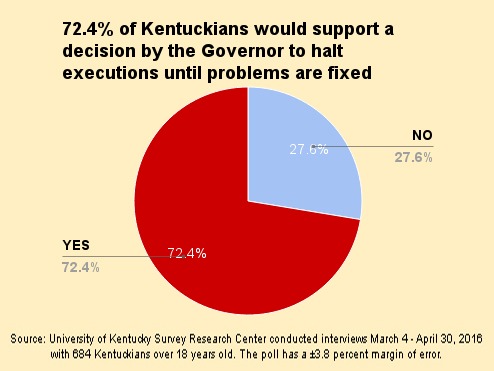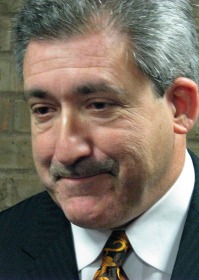
KACDL Renews Call for Moratorium on the Death Penalty until Full Implementation of the KY Assessment Team’s Reform Recommendations
(August 2, 2016) The Kentucky Association of Criminal Defense Lawyers (KACDL) again urges suspension of the death penalty until the serious deficiencies with the way it is administered are corrected.
Yesterday, we learned that a University of Kentucky Survey Research Center poll of our fellow Kentuckians found that most Kentuckians support a halt to executions until the documented problems with the administration of the death penalty are reformed.
As the Commonwealth of Kentucky’s largest statewide association of criminal defense lawyers, KACDL’s members have represented many capital defendants across the state and know firsthand the longstanding problems and the grave, literally lethal errors that have occurred in our system.
With this experience, KACDL in 2011 called on the Governor, the Attorney General, and other Kentucky criminal justice policy makers to fully implement the ABA Recommendations in the Kentucky Assessment Team on the Death Penalty Report and to institute a moratorium on executions until the ABA’s Recommendations were fully implemented. None of the reforms have been put into effect.
“We can wait no longer to make the system of determining whether a person should live or die right,” said KACDL President Ernie Lewis, who has represented many capital clients since 1977. “For the system to be fair and accurate, there are scores of major problems that must be fixed. These include, requiring that interrogations be recorded and eyewitness identifications be done in accord with national standards, exempting those with severe mental illness from the death penalty, requiring instructions to jurors that make sure they understand their precise responsibility in their decision on the sentence, and creating a forensic laboratory system that is conflict-free and wholly independent of law enforcement.”
“These are but a few of the many changes needed to have confidence in our system that has made critical mistakes in our state,” Larry Simon, former KACDL President, said. Simon is a former Assistant Commonwealth Attorney in Jefferson County who has prosecuted capital case and has represented a number of the 19 persons who have been wrongfully convicted in Kentucky.
“There are serious questions about the reliability of the convictions and sentences of a number of inmates facing execution, particularly in those cases that were tried years ago by unqualified lawyers lacking adequate resources, such as in the case of Gregory Wilson,” Dan Goyette, Louisville Metro Chief Public Defender and former president of KACDL, said. “We should not proceed with executions until the sound, sensible and fair-minded recommendations of this impartial, independent evaluation are assured in every case. To do otherwise would cast significant doubt on our justice system and the propriety of imposing the ultimate punishment. We have a fundamental responsibility to avoid at all costs the possibility of making an unjust and irreversible mistake.”
“The error rate in Kentucky capital cases over the last 40 years is not acceptable,” said Ed Monahan, Kentucky Public Advocate and former president of KACDL. “The errors are pervasive. They compel a conclusion that our system is broken. This stunningly high rate of error shows that the system cannot get it right. None of us would put our child on an airplane that returned to the airport over 60% of the time because of defective equipment. A moratorium is necessary to prevent the execution of a person whose conviction and death sentence were imposed unfairly."

Kentucky's Public Advocate and Louisville Metro's Chief Public Defender
Call for an End to Courts' Predatory Collection Practices
Criminal justice costs – including resources required to fund court operations, prisons, prosecutor offices and the right to counsel – are an essential government obligation. Assessing exorbitant fines and fees to people whose contact with the criminal justice system might be as minor as a parking ticket without consideration of the ability to pay is predatory and unconscionable. Further, threatening their liberty for failure to pay is illegal, yet it is an endemic practice in courts across the country.
Daniel T. Goyette, Chief Public Defender in Louisville and Jefferson County, said “While our state has been characterized as a ‘front-runner’ in progressive bail policy, having abolished bail bondsmen nearly 40 years ago and replaced them with a statewide pretrial services system, our jails are still overpopulated by poor people of color, and the reasons have more to do with their socioeconomic status than with public safety… It makes no sense to incarcerate someone at a cost of $65 per day in order to recoup a lesser amount, particularly when there is no reasonable expectation that the person can afford to pay it in the first place.”
Ed Monahan, Kentucky Public Advocate, said “The judicial practices on fines and fees and pretrial release across our state are all over the place. Many judges routinely waive fines and costs for indigents and do not impose monetary bail. However, there are other judges, too many, who not only refuse to waive fines and costs, but impose money bail that poor people cannot pay. Fines should never be assessed against an indigent. Costs should not be assessed absent an ability to pay, and no poor person can be constitutionally jailed if unable to pay. A $200 cash bond is an unattainable amount of money for a poor person. Stuck in jail, too many lose their jobs, see their families go hungry, watch spouses leave them, or lose the homes in which they live. Meanwhile, a similarly charged but financially well-off person suffers none of these consequences.”
Troubling practices in Kentucky include... Read More

The Members Page of this website includes over a dozen litigation tips used by KACDL Director-at-Large Wil Zevely in his DUI practice. Wil is the author of Kentucky Driving Under the Influence Law (2011-2012 edition), and Trends in DUI Discovery (2011 edition): Leading Lawyers on Developing Effective and Innovative Discovery Practices for DUI cases (Inside the Minds).
KENTUCKY'S NEW IGNITION INTERLOCK LAW
There will exist after this bill goes into effect three driver’s licenses: A standard driver’s license, a hardship driver’s license and an ignition interlock driver’s license. (KRS 189A.005(5)
The bill mandates that, at the end of any driver’s license suspension under KRS 189A.070, the Court in most instances shall add to the suspension a restricted license requirement with the ignition interlock. For a first-offense aggravated DUI, the interlock requirement is 6 months. For a second-offense DUI, the interlock requirement is 12 months. For a third or more offense, the requirement is 30 months. (KRS189.A340)
The bill does not affect any prior law involving DUI drug impairment or per se DUI drug convictions. It also does not affect kiddy DUI’s or first-offense adult DUI’s without an aggravator. Hardship licenses are now available only for first offense without an aggravator, kiddy DUI’s or drugs with impairment or per se drugs. (KRS189A.410)
The dramatic change in the bill is that Defendants are eligible for an interlock device for ANY license suspension under 189A.To read the rest of Wil Zevely's post, click here.
Additional Ignition Interlock resources:
Ignition Interlock Questions and Answers
Mark Joseph Stanziano (1957 – 2014):
Dedicated Defender and Compassionate Counselor – First, Last and Always
by Dan Goyette and Mike Healy
On Friday, June 27, 2014, our longtime friend and colleague, Mark Stanziano, passed from this vale of tears, apparently struck down at the hands of a troubled, needy individual, one in a long line of people in such circumstances to whom Mark had extended a caring, helping hand over the course of his illustrious career. That it happened as he was walking toward his office at 8:00 a.m. to begin another day doing what he did best – protecting the rights and representing the interests of his clients in the Courthouse just across the street – in some ways was a cruel twist of fate, but one that might have evoked that sardonic, “Cool Hand Luke” grin of his that we all knew so well … for he “died in the saddle” at the height of his considerable skills as an advocate, certainly far too young, but in the milieu he so enjoyed, preparing to do the work for which he had such great passion and to which he had devoted the better part of his life.
As Ernie Lewis mentions in his accompanying article, Mark was a warrior in defense of the accused, and he never shied away from the fight against injustice. Mark truly made his unique “mark” on our profession, on the quality of justice his clients received, and on the numerous lives he touched as a lawyer and as a man of principle. Among other honors, he was elected as President of the Kentucky Association of Criminal Defense Lawyers (KACDL) in 1998-1999. Not only was he a Life Member of the Association, who served on its Board of Directors until the day he died, but he was the recipient of both the KACDL Frank E. Haddad, Jr. Award for exceptional professional achievement and the KACDL Distinguished Service Award for his contributions to the improvement of the criminal justice system. As we mourn Mark’s death and celebrate his life, here are some of the thoughts, reflections and memories of his friends and colleagues... Continue
Friends hope to honor slain Somerset lawyer through endowment fund
From Ed Monahan, Kentucky Public Advocate
Mark's family, friends and colleagues joined to celebrate his life and his service on the first day of July, 2014.
Speakers included Ernie Lewis, Ed Monahan, Jim Cox, Jerry Cox, Bryan Daniels, Ami Beckman and Brenda Popplewell.
Their reflections and testimonies are shared here, to be printed, kept, remembered, circulated, and acted upon.

After 14 years on death row...
"I just want to know why the prosecutors - who hid evidence, sent me to prison for something I didn't do and nearly had me killed - are not in jail themselves." - John Thompson
In a recent editorial, the New York Times responded to the U.S. Supreme Court's decision in Connick v. Thompson by calling for open-file discovery:
"Outrageous breaches of due process rights in such cases show that the Brady rule — which seems essentially voluntary in some places — is simply insufficient to ensure justice.
"A better approach is to require the opening of prosecutors’ files to defendants, as a general rule. North Carolina adopted open-files reform to make criminal cases more efficient and fair. The state statute requires prosecutors in felony cases, before trial, to make available to the defense “the complete files of all law enforcement agencies, investigatory agencies and prosecutors’ offices involved in the investigation of the crimes committed or the prosecution of the defendant.” The statute has improved the justice system, including enhancing fairness in plea bargains.
"Ohio has followed North Carolina’s lead, and other states should as well."
Read the May 18, 2013 New York Times Editorial
KACDL requests that members forward to the Board their thoughts on how to amend Kentucky's Criminal Rules of Procedure to require open-file discovery.
You may also be interested to read:
"The Myth of Prosecutorial Accountability after Connick v. Thompson: Why Existing Professional Responsibility Measures Cannot Protect Against Prosecutorial Misconduct," The Yale Law Journal Online Read

If you are old enough to remember the Iran-Contra hearings,
you recognize the title of this post. Those are the immortal words of Brendan Sullivan the lawyer representing Oliver North. When congressmen complained that Sullivan was objecting too much to their questions to his client, Sullivan said, "I'm not a potted plant. I'm here as a lawyer. That's my job.” I was in law school at the time of the hearings. I remember laughing and cheering when he said that to a pompous lawmaker. People don't understand what criminal defense lawyers do. They may think our job is to play along with the system so that the minimum technical requirements of the law are met before we convict someone. They may think that we are double-breasted-suit-wearing slick talkers. If it seems like we are the only ones slowing down the wheels of justice that are running over someone, that is probably right.
I tell my clients that I am the only person in the entire system working for them. The prosecutor is actively trying to put them in jail or prison. The police are certainly trying to accomplish that. Probation officers would rather you do time than be on probation. Bailiffs usually are wanting the person to plead so they don't have to keep bringing them to court. And of course judges want to clear their backlog of cases from their docket. The criminal defense attorney is the only person asking, "Was there a crime committed and can the state prove it?" This slows down the jail express. We get asked all the time, "Why won't your guy plead?" I don't recall ever being asked, "Can the government prove your guy guilty beyond a reasonable doubt?"
The point is, I'm not just a potted plant! What self respecting lawyer would want to be just the guy who tells you to plead guilty or everyone will get upset with me. As a criminal defense lawyer I have work to do. I strive to treat clients the way I would want to be treated if I were in their position. I would want more than just a potted plant.
Doug Weathers
Hendricks, Weathers & Jefferson
Fort Worth, Texas
http://hwlawfirm.blogspot.com

About KACDL
The Kentucky Association of Criminal Defense Lawyers (KACDL) was formed in 1986 by renowned criminal defense lawyers Frank Haddad, Charlie Coy and Bill Johnson, along with other prominent attorneys, to address the criminal defense bar's lack of influence in the drafting of Kentucky's Truth-in-Sentencing law. For over twenty-five years, KACDL has effectively and progressively interacted with the General Assembly in the legislative process. KACDL has had an active voice in the 1997 Governor's Criminal Justice Response Team, the 2003 Kentucky Penal Code Revision Project, the Kentucky Criminal Justice Council and the Kentucky Supreme Court Rules Committee, speaking on behalf of the criminally accused and providing support for their defenders.
Today, KACDL is the only organized, statewide, all-inclusive group of criminal defense lawyers in Kentucky. We remain committed to penal code reform, to fairness and justice for all citizens accused of crimes in the Commonwealth of Kentucky, and to unwavering service to the criminal defense community through effective and supportive networking, advocacy and education.

